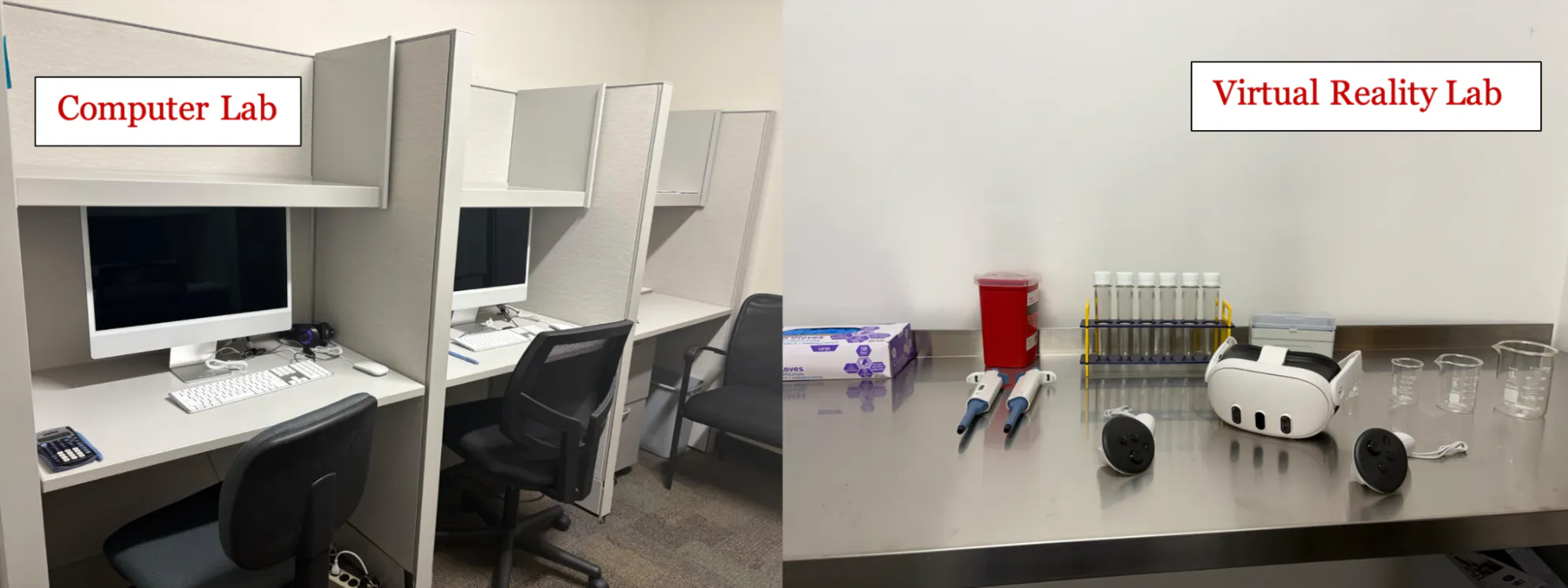Cognition and Active Learning Lab
Introduction

Welcome to the Cognition and Active Learning (CAL) Lab! The CAL Lab involves the application of cognitive psychology principles to the study of effective teaching and learning strategies. We aim to bridge cognitive psychology and education and contribute to the science of learning. More specifically, the purpose of our lab is to determine how to design instruction to encourage effective cognitive processing in students with a particular focus on STEM content.
We consider instructional design in a multitude of contexts (e.g., in small and large courses, for introductory and advanced content) and using different media (e.g., real-world instruction, immersive virtual reality, artificial intelligence) to advance our understanding of how to support active learning in STEM courses. Our work involves quasi- and true-experimental designs that take place in lab and class settings and systematic reviews to evaluate research literature related to psychology, educational psychology, and education.
Meet our Team
Research Themes
Under this project theme, our studies investigate research questions such as:
- Should lecture and activities be used in isolation or in combination to promote student learning?
- Should lecture or activities be presented first or second in an instructional sequence?
- How much time should be dedicated to lecture versus learning activities during a lesson?
- How can learning activities be designed to assist students in encoding new content?
Under this project theme, our studies investigate research questions such as:
Should immersive virtual reality be used to present new content (e.g., as a form of lecture), to practice new content, or for both instructional phases?
How should instruction be sequenced (e.g., modeling, guided practice, independent practice versus modeling, modeling, independent practice versus guided practice, guided practice, independent practice) within virtual reality to maximize student learning?
How can we encourage effective collaboration within virtual environments?
How can we use artificial intelligence during a lesson to support student learning?
Under this project theme, our systematic reviews investigate questions that span different research literatures such as active learning, learning and motivation, immersive virtual reality, ChatGPT, and productive failure. Example research questions include:
How methodologically rigorous is the [insert name] literature?
What are the strengths of the [insert name] literature base, are there any areas in need of improvement, and do any research gaps exist?
Within the [insert name] literature base, do interventions vary in their design and implementation and, if so, how?
How well designed and controlled are the experimental and control conditions within the [insert name] literature?
Research Opportunities
We are always looking for collaborators on new projects, as well as for undergraduate/graduate students and visiting fellows.
Collaborators
Please email Amédee Marchand Martella , CAL Lab director, expressing your interest in collaborating on future projects.
Undergraduate Students
Please email Amédee Marchand Martella and Ryan Patrick to express your interest in serving as a research assistant in our lab. In your email, please list your major and research interests. Members of our lab also have the opportunity to conduct CURO research.
Graduate Students
If you are interested in joining the CAL Lab as a Ph.D. student, please email Amédee Marchand Martella to ensure students are currently being accepted before applying to the Ph.D. program in applied cognition and development in the Department of Educational Psychology.
Visiting Fellows
If you are interested in being a visiting fellow, please email Amédee Marchand Martella .